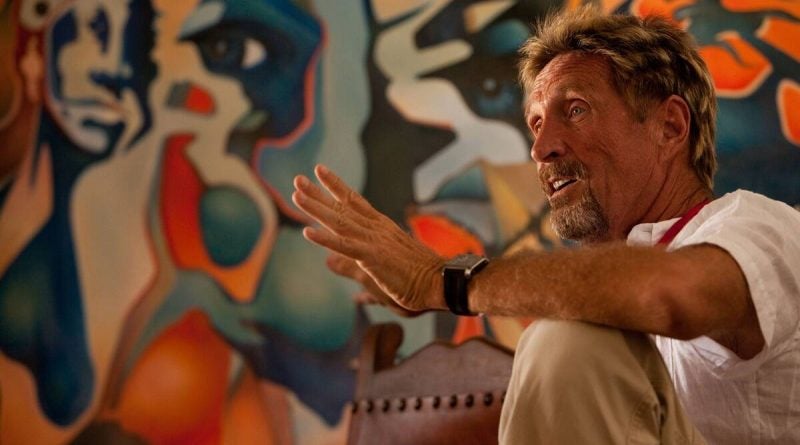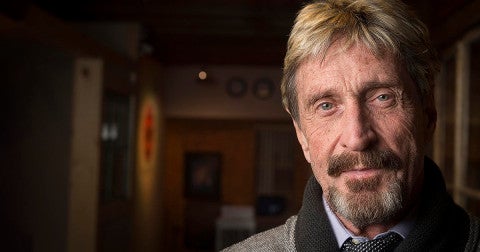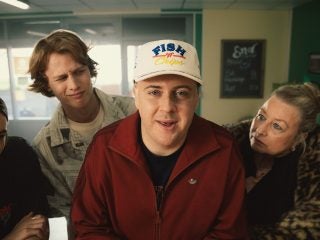John McAfee’s life has been a whirlwind of tales worthy of a spy novel or a Hollywood action film: money, boats, sports cars, guns, exotic locales and fame, intertwined in a bizarre mix of intrigue and eccentricity.
McAfee is most famous for the antivirus product and company he worked for, both named after him. Despite having no connection to the company in nearly 30 years, many still believed he was responsible for the current product that has engendered much criticism.
He was found dead of suicide at age 75 this week, in a Spanish prison, after being charged with US tax evasion, and was also indicted earlier this year on separate fraud and money laundering charges.
According to reports, the US Department of Justice alleged that he and a business partner partook in a scheme that earned more than $13 million by falsely promoting cryptocurrencies to unwitting investors.
In 2013, he made headlines for a satirical viral video he made poking fun at himself, his lifestyle, and his detractors called How to Uninstall McAfee Antivirus Software. He again made headlines in early 2013 while living in South America, as officials were said to have tried to blackmail him, harass him, and even suspected him of killing a neighbor.
Early in his career, he was employed as a programmer by NASA’s Institute for Space Studies in New York, from 1968 to 1970. From there he went to UNIVAC as a software designer and later to Xerox as an operating system architect. In 1978, he joined Computer Sciences Corporation as a software consultant. Later, while employed by Lockheed in the 1980s, McAfee received a copy of the Pakistani brain computer virus, and began developing software to combat viruses.
In 1987, McAfee founded McAfee Associates, a computer antivirus company developing into one of the most popular and most known antivirus softwares. Other business ventures he founded included Tribal Voice, which developed one of the first instant messaging programs, Powwow.
Weeks before I conducted this interview June 20, 2013, in podcast form, more controversy and a fantastical adventure followed him. There were wild stories of armed guards, alleged extortion, women and more women, cars that cost the same as the GDP of a small country, and rumors of deadly drugs.
Much of it began in April 2012, when McAfee’s property was raided by the gang suppression unit of the Belizean Police Department. A press release stated that McAfee was arrested for unlicensed drug manufacturing and possession of an unlicensed weapon. He was released for that charge.
In November of 2012, Belize police started a search for McAfee as a “person of interest” in connection to the murder of an American expatriate, a neighbor of his. No one was formally charged. McAfee left Belize via Guatemala, and in December 2012, he was suddenly deported to the United States, arriving in Miami, then making his way to Oregon.
In this interview, I endeavoured to get some back story, debunk some myths, add some details about his life, past and present. This interview has never been in print, and the site where the audio was hosted was, ironically, hacked beyond repair, two months after I spoke to McAfee.
DAVE GORDON: You were in Belize up until recently (2013). Why stake a home there, and what’s life like in Belize?
JOHN MCAFEE: I’d like to preface this by saying I’ve I have traveled throughout the world, and there are a few nice places I have not seen, and I think Belize is probably the top of the list, and in terms of physical beauty. It has the second longest Barrier Reef in the world, which creates a crystal clear, aquamarine pool inside the reef that’s calm year around – which means you can get to the docks, and put boats right on the ocean. You can do that nowhere in America, for example, because of the waves that pound right against the shore. It has jungles that match the Amazon, and even surpass them. It has jungle rivers that are second to none – dark, slow moving, lined with jungle greenery, crocodiles, howler monkeys, and every manner of jungle life. So, it’s a physically astonishingly beautiful place. I like physical beauty. I like I like the ocean. I like watersports. I built a large stock. I had a sailboat, many, many power boats. I snorkeled, and dove, and fished, and it’s probably one of the greatest places in the world for just playing with nature.
DAVE GORDON: And you were there for the purposes of just hanging out? Or did you conduct business there?
JOHN MCAFEE: Well, you know, when I first went, it was just for the purpose of hanging out. I was planning to simply spend my remaining years sunning on the beach, and enjoying myself. Unfortunately, my personality is that after three or four weeks of inactivity, I become excessively antsy, and want to do something. So, the first thing I did was found a ferry service called Coastal Express that transported visitors and locals up and down the island of San Pedro. It was a monopoly, but I handed the business over to locals and never took a dime out of it. We carried – during the peak – probably 20,000 passengers a week. So, a highly successful business.
I also founded a watersports business, a flying business, a coffee shop where I had a coffee business, a cigar business – manufacturing cigars, manufacturing coffee. Again, I have to keep busy or else I get in trouble. As you can tell, even if I do keep busy, I still get in trouble. So, I don’t know what the solution is.
DAVE GORDON: And these businesses, are they still going after things got hairy?
JOHN MCAFEE: Everything is still going except the water sports and the flying business. The flying business was inappropriately located. I built a hangar on the San Pedro airport – one of the busiest in the world, and one of the shortest runways – so planes were landing every few minutes, and I was trying to take off in these little ultralights to show tourists the islands. The conflict was untenable, so I shut that down. The water sport business was simply a seasonal business. During the offseason, it was hard to keep employees motivated and retained, so I shut that down as well.
DAVE GORDON: Let’s fast forward to the YouTube video. First of all, it’s gone viral (that’s a joke). A lot of media attention. Love to know what the genesis for that was. What was the inspiration to put that together?
JOHN MCAFEE: Well, it’s titled How to Uninstall McAfee Software. But in truth, I did it to attempt to uninstall the McAfee negative image. I think that nothing is more disarming than making fun of yourself. The media has called me paranoid. I did the best I could in a paranoid rant in the video. They slapped me around for having seven girlfriends simultaneously. They accused me of doing bath salts – certainly the most absurd of all of the charges. I still have enough money, I think, to buy cocaine if I wanted to do drugs. Bath salts are those same drugs that caused the man to eat the face off of another person in Miami last year, you know? But if they want to say that, I’ll label the boxes ‘bath salts’ on the table. They’ve made much of the fact that I was surrounded by men guns and carried guns.
So, I had gotten this all over the table. I was just trying to make fun of myself. If you do it successfully, then your detractors have a difficult time continuing their probing. So that was that was the big intent. And, seriously, the letters I was reading (about the antivirus software) are real. This is the truth. I typed, ‘fuck McAfee’ into Google – you can try it yourself – in the first page of results for all of those letters. So, I made nothing up. In fact, some of the most hardcore, I simply did not did not read. The software clearly has touched a raw nerve in the user community.
By the way, at the height of last year when they were claiming I was a murderer and so on, the articles about me, over half of the comments were about the software. People were going, ‘I wish they would hang the bastard for developing such horrible software.’ You know, I have nothing to do with that software. So, I thought the joke would be, ‘Since I have nothing to do with it, and since you’re really angry at me, I will try and make recompense by telling you how to uninstall it.’
DAVE GORDON: Curious why you didn’t do any damage control over the course of two decades since you’ve last had much to do with the McAfee virus company. You share the name of the product and the product shares your name. Why now? Why try to set the record straight now? Why did you care now?
JOHN MCAFEE: Not that I care so much as, again, I’m have to keep busy in order to stay out of trouble. There are a couple of reasons, quite frankly. Number one, I’m doing a full-fledged feature length documentary with a company in Canada. In fact, I just came back from Montreal today. It doesn’t hurt to keep attention on the subject, if you’re doing a documentary. We’re also doing a feature film. I’ve been speaking with Hollywood notaries for the past two weeks. I spoke with the director of X-men, Bryan Singer. I had lunch with him. I’ve spoken to someone that I can’t say the name just yet, but it’s the person I really hope we can cooperate with because he will make me look like an idiot, and I will enjoy it.
So, we have we have projects going on, and it never hurts to do some publicity. And number three, why not now? At the height at the height of all the chaos, I couldn’t possibly poke fun at anything. It would have been insensitive, sir.
DAVE GORDON: Yeah. The documentary that the Montreal based companies putting together, I understand, is tentatively called Running in the Background…
JOHN MCAFEE: No. Actually. Running in the Background is the screenplay for the feature length film.
The documentary is just a pure documentary, and I’m not sure it has even the working title yet. Although, I spent the last five days filming 10 hours a day. So, I’m fairly exhausted from that.
DAVE GORDON: You did have heavy artillery around you, you did have a lot of women around you. It’s hard not to jump to the conclusion that just even visually comes off as kind of wacky and eccentric.
JOHN MCAFEE: Keep in mind, I was living in the jungles as the only white man and a district of 20,000 natives. I had stupidly conspicuously displayed my wealth by buying new cars, building huge buildings in an area where the average salary is $5 a day, sir. $5 a day.
DAVE GORDON: And that’s average. Most people probably make less.
JOHN MCAFEE: That’s correct. So, obviously, if I’ve got a car that cost $150,000 – like a brand new Ford truck, given the huge customs duty on new imports – and someone’s making $5 a day, this is a 50 lifetime worth of salary for one of my trucks. So clearly, if you’re going to rob somebody, are you going to rob the guy next door who is also making $5 a day, or the insignificant foreigner who’s not one of us, who is already displaying more wealth than the entire district has for gross national product.
So, I started getting thefts and robberies. So, I built a fence and hired armed guards. I mean, it seems like a very natural response to me. That may not be a natural if you are living in Pocatello, Idaho, or somewhere in a flowery part of New Jersey, but unfortunately, in the jungle when you’re the only white man, it was a natural response.
As to the women, I’m 67 years old, sir, don’t I deserve some sort of recompense for living that long? I certainly took advantage of none of them as history will certainly prove.
DAVE GORDON: Okay, so you were target of sorts in Belize, and you’re also something of a target back in the Americas. I read you change your IP and other digital footprints to evade hackers. You have others buy your computer equipment, because people are trying to hack into you on a daily basis. Is that correct?
JOHN MCAFEE: Right. And please don’t consider this paranoid. If you are a hacker, who would be your prime target? Wouldn’t it be the guy that invented the anti-hacking program? If don’t do these things, my computer goes down every two hours. So, I do take such and such care and caution with my systems? I do.
DAVE GORDON: I wonder whether somebody out there is thinking just the very opposite, that you’re going to outsmart them and they won’t even try. How often have you been hacked?
JOHN MCAFEE: For the past eight or 10 years, only once. Prior to that, when I first left McAfee, I couldn’t even use the computer for more than a week. I had to get rid of it, and get another, because people were getting into my system. Keep in mind that hackers are organized today. There’s a group called Anonymous that has some of the smartest hackers in the world. By the way, I respect those people. Don’t say anything negative about them from my mouth, because I don’t want to say anything. I do respect them. I think they’re brilliant. And I also back their goals. However, you know, an Anonymous hacker on a bored evening with nothing better to do could be forgiven for thinking, ‘Well, Jesus. Maybe I can find McAfee’s computer and shut it down.’
My behavior for the past 10 years or so has made it extremely difficult. It would be most unusual for them to know even where my computer is, let alone what it is named and what its IP address is.
DAVE GORDON: I’d like to talk about this Anonymous thing. It sounds like you have an admiration for them, but they’re causing a lot of chaos. They’re causing a lot of worry and wrecking a lot of people’s websites. This is an object of scorn for people not respect. Why respect from you?
JOHN MCAFEE: Because their underlying goal is one of value. For example, freedom of information. Have you ever considered, Sir, what would happen if Google suddenly said, ‘You have to pay for information’? Every time we do a search, you got to pay us. Do you realize we would have to? We have become so dependent on information that the cutting off of access to the internet and to the free flow of information would be devastating to everyone’s life. How many times a day do you do a search on the internet? Hundreds. Everybody does. Now, unfortunately, the free flow of information is restricted by many agencies – governments, states, corporations, all sorts of businesses. The goal of Anonymous is to prevent the restriction of data access, an astonishingly good goal. And now the way they’re going about it, well, you know, maybe they could choose a better approach.
DAVE GORDON: I read that you have a couple of pastimes that I found rather intriguing. One of them was yoga and one of them was painting. Do you still do both? And if yes, what do you paint? And what kind of yoga do you do?
JOHN MCAFEE: You know, I have not painted in many years, sir. It requires it requires a little bit of stationary existence. That is, to set up a place with an easel, to locate the paints, find somebody who can stretch your canvas, and so on and so forth. I haven’t done much of that. I don’t do a lot of yoga anymore, although I did some last night. But it’s not as frequent as I would like. And I would say that both activities I would highly recommend for anyone who is high, strong emotionally or intellectually.
DAVE GORDON: You grew up in a Christian background went to church, you were an altar boy, wondering if religion factors into your life today?
JOHN MCAFEE: Well, only in that I stay as far away from religious discussions as I could possibly stay. Here’s how it factors in. In 2008, I gave the commencement address at my alma mater, Roanoke College in Salem, Virginia. I thought long and hard about what to say, because I was, after all, talking to the future leaders of our country – some of them anyway.
I told the truth, and the truth is not something that the establishment really wants to hear, at least as I’ve perceived the truth. That is, you have to make your own path. You have to avoid taking authority on as your God, on and on. So when I sat down after the commencement address, and I was I was shocked that they didn’t actually haul me off the stage during the address. The college chaplain who was sitting next to me, leaned over and whispered, ‘Sir, when did you lose your faith?’ And it was like a shock to me that faith requires a toeing of the line, in effect. If you step over this line, faith cannot go with you. And that’s a tragedy, sir. Faith itself – if a religion had value in life – then it would encompass all things.
DAVE GORDON: On your blog, you said quite adamantly that you haven’t touched drugs -even though there was some sort of speculation based on a practical joke that you had created by making up a drug formula…
JOHN MCAFEE: …that formula, by the way, was for the absolute worst of all of the bath salts, okay? For a drug called MDMA – a terrible, terrible drug. I mean, something that by its most objective descriptions, no one in their right mind would ever touch.
I went on and glorified it. The technical people on that forum – because the forum did have PhDs in chemistry and things – immediately said, ‘This is nonsense. This is nonsense. The guy’s pulling your leg.’
If you go and read that, you will see that all over the first few weeks of my posts – which went on for a couple of months – it was so obviously a hoax. But people were believing it and as long as people will continue to believe it, I will run with it. Just like that poor lady working for the Village Voice that called me, unfortunately, 11 o’clock at night when I was in Belize and asked me what I was doing. I said, ‘Well, I’m up to observational yoga, where you sit in an easy chair, and drink wine, and eat cheese, and watch people do yoga, and you gain all of the benefits.’ Well, she wrote an entire story about that. Well, as long as she’s gonna run with it, I will continue to run too.
DAVE GORDON: Let’s look back four decades: smuggling, selling drugs, Mexican jails. What influenced you to go to rehab and AA in 1982, and stop drinking and drugging?
JOHN MCAFEE: If you continue to use drugs, with full heart and mind, you will hit bottom. I do not care who you are. I did just that. I hit bottom. I had nowhere to go. I had been I’ve been seeing psychiatrists and shrinks, trying to stop using drugs. And finally, one woman said, ‘Look, sir, I cannot help you. I cannot help you. Maybe these people can help.’ And it was Alcoholics Anonymous.
DAVE GORDON: It’s no secret that you’ve parked in Oregon, of all places. You’ve got all this film stuff going on, you’ve made the YouTube video, you’ve also got a few other projects in the pipe. I’d love to know more about future stuff…
JOHN MCAFEE: There’s a whole bunch of stuff in terms of the books, and things, not all of them are from me. Some of them, unfortunately, are fairly devastating. One – and this is actually done by the young woman I am madly in love with and living with –we have not always been madly in love, and living together. And she wrote a tell-all book, after the explosive events of Belize. She signed the contract, which cannot be revoked, and unfortunately told way more than I wanted anybody to ever expose. It’s like anything, you will tell your wife – perhaps or your lover – anything thinking or hoping that that will stay with your lover.
When people reach on unusual circumstances, like mine – I’m in the international news – people will take advantage of it. So, that’s what happened. Janice, the young lady I’ve been with here for quite a while, has done just that. We got back together in spite of it. I tend to be very forgiving person.
That’s one of the unfortunate ones. But others like the biography being written by George Jung, while he’s in prison. I don’t know if you’ve ever read anything written by him. He is one of the most poignant authors I have ever read.
DAVE GORDON: He was the guy that did Blow, right?
JOHN MCAFEE: Yeah, that’s right. Well, he’s actually the subject of Blow. He’s in prison because – at his height – he was doing $40 million a day worth of cocaine to his private island, in the Bahamas. So, a big guy, but a very sensitive soul. So he’s doing the biography. I have a documentary and a feature film coming out. I have a cartoon novel being written by Chad Essley here in Portland that’s coming out. So, I’m keeping busy with projects.
DAVE GORDON: Would you ever reenter the computer realm? The software realm?
JOHN MCAFEE: No, I doubt that very seriously, sir. It does not interest me much anymore. I’m interested more in human relationships, and more outward things. Software is a very lonely profession that involves the relationship between you and your logical construct, which is the architecture of your program. Other people have nothing to do with it. That no longer interests me.






















